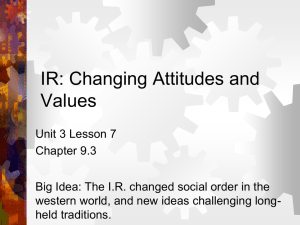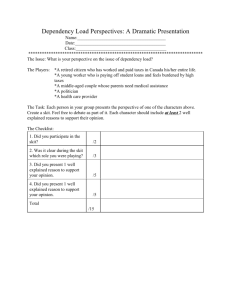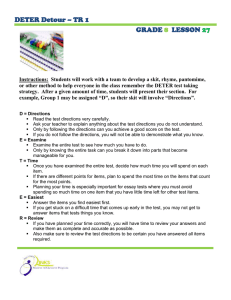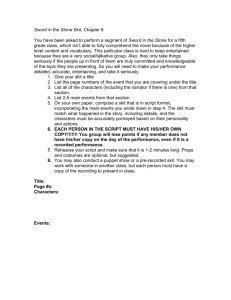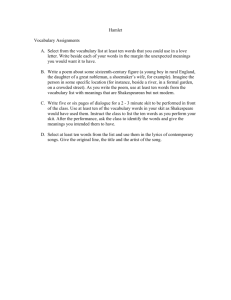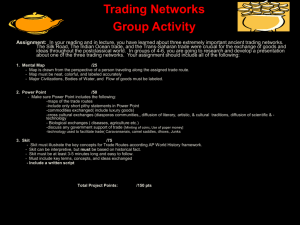Industrial Revolution Link Click Webquest
advertisement
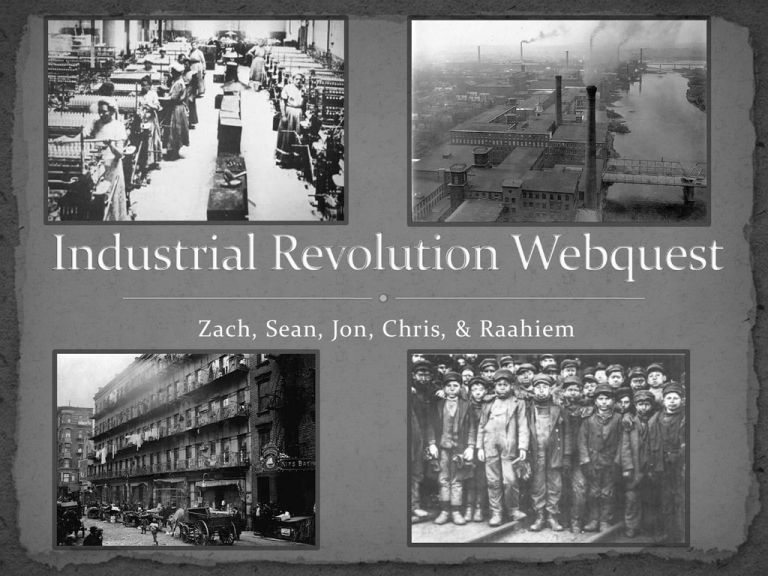
Zach, Sean, Jon, Chris, & Raahiem This webquest asks the student to analyze the process of union formation during the American Industrial Revolution c. 1877-1920. It will require personal research along with group interaction coalescing into a skit; which will be performed from differing perspectives that would have existed during that time period. The student is required to reflect on the following questions. What were the diverging perspectives of workers facing the proposition of union formation during that time? How were owners of labor likely to respond to the idea of unionization during that period? How was the political climate of the country affected by unionization? The theatrical element associated with the assignment introduces an interpersonal component that allows the student to gain an experiential knowledge of the industrialization period through intellectual interaction. The Industrialist: Put yourself in the shoes an industrialist during the 19th and 20th century. How did the rapid expansion of the factories of the industrial revolution put a high demand on the industrialist and the factory workers. Did the major industrialists actually care about the worker’s well being? In addition to your role as an industrialist you will need to write a 3 page paper outlining why the three major industrialists (Slater, Rockerfeller, Carnegie) were significant to the American industrial revolution. You should include what their specific industry was, what made them different from each other and what made them successful. Use this information, along with the rest of the group, to create a skit enacting all the different points of view. http://www.pbs.org/wgbh/theymadeamerica/whomade/slater_hi.html http://en.wikipedia.org/wiki/Samuel_Slater http://www.spartacus.schoolnet.co.uk/USAcarnegie.htm http://en.wikipedia.org/wiki/Andrew_Carnegie http://www.pbs.org/wgbh/amex/rockefellers/peopleevents/p_rock_jsr. html http://en.wikipedia.org/wiki/John_D._Rockefeller Pro-Union Worker Working conditions during the Progressive Era were terrible. The Muckrakers and people like Upton Sinclair in his book The Jungle exposed the dirty conditions in the factories. Workers who were fired were quickly replaced. Many people died working in factories during the early 20th century. The millions of immigrants who came to America at this time were perceived as not being loyal to the country if they complained and went on strike because of the dangerous working conditions. Many laws and amendments were added to the U.S. Constitution to make conditions safe for the worker and consumer. Put yourself in the position of a factory worker during the Industrial Revolution; would you want to work in these conditions? Were the grievances of those joining unions legitimate? Use the following links to research what it was like in the late 19th and early 20th century in America: Write a three page paper discussing the point of view of a typical factory worker. In addition, use this information, along with the rest of the group, to create a skit enacting all the different points of view. http://www.dol.gov/oasam/programs/history/mono-regsafepart05.htm http://www.digitalhistory.uh.edu/modules/progressivism/index.cfm http://www.digitalhistory.uh.edu/modules/progressivism/index.cfm http://www.dol.gov/oasam/programs/history/mono-regsafepart05.htm Political Advocate The following websites contains information relevant to five political parties that existed during the period of American Industrialization. Access and research the information to determine the ideological spectrum of each and based on those characteristics; choose a party to represent the perspective of a politician that would have been a proponent of either the union advocate, or the anti-union business owner. The latter two links give accounts of the coal strike of 1902 and the effects that unions had upon child labor; analyze the political sentiment within them to help accurately depict your chosen political position. Write a three page analysis explaining your decision being sure to discuss why this individual would or would not have supported either side; site specific information from the chosen source to support your inference. In addition, Use this information, along with the rest of the group, to create a skit enacting all the different points of view. http://www.cddc.vt.edu/marxists/history/usa/eam/slp/socialistlaborparty.html http://projects.vassar.edu/1896/republicans.html http://mshistory.k12.ms.us/articles/163/farmers-the-populist-party-andmississippi-1870-1900 http://dlib.nyu.edu/findingaids/html/tamwag/sdp.html http://www.presidency.ucsb.edu/ws/index.php?pid=29587#axzz1ZOkRlAwl http://www.dol.gov/oasam/programs/history/coalstrike.htm http://www.continuetolearn.uiowa.edu/laborctr/child_labor/about/us_history.html Anti-Union Worker The Anti-Union Worker’s job will be to present, from a worker’s perspective, why their fellow workers should not be in a union. Their research will include finding disadvantages that could arise for a worker that joins a union. Write a three page paper explaining the point of view of an anti-union factory worker. In addition, use this information, along with the rest of the group, to create a skit enacting all the different points of view. Here are some websites that might help the Anti-Union Worker support their position: http://www.mackinac.org/2313 (This is a more modern perspective, so do not rely completely on this.) http://eh.net/encyclopedia/article/friedman.unions.us http://www.helium.com/items/1121656-rise-of-labor-unions-industrialrevolution Split Worker There were numerous reasons why many workers felt like joining unions during the Industrial Revolution; but, due to the violence enacted towards unions, many were scared to join or be involved with unions. Many other reasons existed complicating the decision. You will write a three page paper addressing the viewpoint of an worker analyzing all of the pros and cons of joining a union during this era. In addition, use this information, along with the rest of the group, to create a skit enacting all the different points of view. http://www.history.com/topics/knights-of-labor http://www.history.com/topics/strikes http://www.ushistory.org/us/22a.asp http://eh.net/encyclopedia/article/friedman.unions.us As a whole your groups should have learned the following from this project: What were the advantages and disadvantages of Labor Unions during the Industrial Revolution for workers? How did others feel about workers forming unions, especially politicians and major industrialists of that era? How did the Industrial Revolution affect the area you live in? In your opinion, were unions a good for the Industrial age or bad? Why? Evaluation Insufficient (under ½ credit) Sufficient (1/2-3/4 Credit) Accomplished (Full Credit) Content of Paper (30 pts.) Thoughts were incomplete or nonexistent; paper addressed the wrong topic/had irrelevant information. Plagiarized and incomplete papers receive no credit. Few minor mistakes. Not enough information included. Paper includes all information specified. Many examples and large use of quality primary and secondary sources. Group Participation (5 pts.) Individual student missed all work days or offered no assistance to the group whatsoever. Individual student does not fully assist the group in all aspects of the project. All members of the group provide thoughtful insight to project. Equal participation and work ethic from all. Creativity (20pts.) Skit was not entertaining or not informative at all. Skit was mildly entertaining and insightful. Skit is original. Group went over and beyond to represent the time period. Entertaining and insightful. Content of Skit (35 pts.) Skit contained no information of use whatsoever. Skit was about the wrong topic. Script was plagiarized. Information included was not fully pertinent; skit seemed to be more fun than educating. Includes all pertinent information. Essentially includes most of the information of an “accomplished paper”. Other (10 pts.) No or very few parts turned in at all. Plagiarized. Incomplete a more than three days after due date. Few minor citation errors. Group went past due date a day or two. Paper and skit are organized. Project completed in allotted time frame. Images from Clipart and Google Images Ohio Department of Education (March 2011). Social studies model curriculum development American history standard 6. Retrieved from http://www.ode.state.oh.us/ The rest of the links on various pages.
